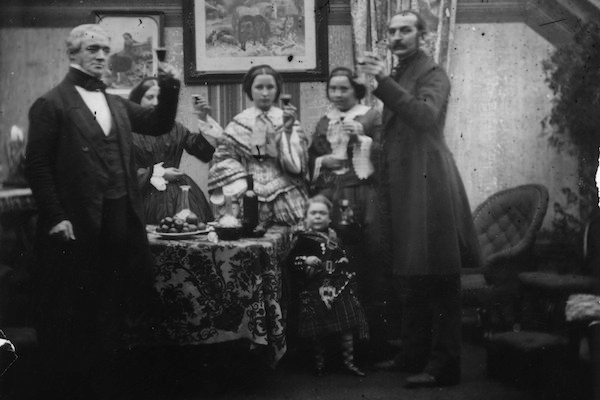What are the big themes in wine today? High rates of duty loom large, as does their impact on prices. There are some concerns for consumption, but no one seems too keen to keep a lid on it (not least among the Fourth Estate).
Discovering the next big thing becomes ever more competitive as the wine world expands too; and we are (rightly) living through a fetish for rare grape varieties. The bravura new Spectator Archive, cataloguing every magazine from 1828 till 2008, tells us little has changed. Wine duty was a hot topic in Victorian times. In March 1860, a correspondent wrote:
‘Of all the articles in the long lists of Customs and Excise, there is not one which has so often, and to such a degree, been experimented upon, as the single item of wine.’
That year William Gladstone, Chancellor of the Exchequer, reduced the duty on foreign wine. ‘The duties,’ he claimed, ‘stood like a wall of brass between the poor man and a glass of wine.’ The Victorian Liberal vision of New Labour’s café culture. Eight years earlier, another correspondent wrote the following, albeit it seems to me not with a straight face:
‘Although but slightly discriminating, the present wine-duties, as we have shown before, limit both the quantity consumed and the choice: they have, however, found a defender in a correspondent of the Times, ‘whose position and experience’ as a wine merchant… ‘are unquestionable’. He does not, like Mr Shaw, the able advocate of lowered duties, who is in the same business, append his name to his arguments, but signs himself ‘Ex Vino Pecunia’; and indeed he seems to think cash both the test and the true product of a good grape. We have the advantage, therefore, of the strongest and most orthodox arguments to be advanced on that side.
‘Mr E.V. Pecuina…does not altogether oppose alteration of the duties; but in lieu of a change beneficial to the pocket of the consumer, he proposes a reform which shall induce a declaration of permanency in the present high duties, abolition of the drawback as conducive to fraud, and abolition of the difference in favour of Cape wines, the duty on which should be raised. In keeping off cheap wines, Pecunia professes to be defender of the stomach of the Englishman.’
Thick put-downs run deep in Spectator blood. The magazine has always had a taste for the finer things, but knows how to rubbish a snob when it sees one. ‘Mr E.V. Pecunia’ warded his countrymen off cheaper wines self-interestedly, to safeguard his ‘finer’ plonk.
These days, wine merchants take a different and more honest tack. As a result of high wine duties, which are fixed, your cheap supermarket wines are the worst value wines money can readily buy. This much is blindingly obvious, though we’ve been saying it for decades, as this magazine’s literary editor Geoffrey Wheatcroft did in October 1978:
‘It can, of course, be demonstrated mathematically that the less you pay for a wine the worse value, in a sense, it is. The duty is the same on a bottle of Chateau Margaux as on a bottle of Algerian Undrinkable, about 60p per bottle at the current rate. Thus, for a bottle costing 90p (such as it is possible to find), only a third of your money is spent on wine; two thirds goes to the Government to be spent in some displeasing way. With a £6 bottle there is at least the consolation of knowing that nine-tenths of the outlay is going on the wine. It follows that in England very cheap wine is to be shunned, while in countries with a less wicked taxation rate on wine the cheap wine can be treated as we treat beer.’
What is perhaps most striking about Mr Wheatcroft’s article is the price of wine. Long gone are the days when one could locate bottles of wine for under a quid (heaven help you if you still can). Kingsley Amis, in November 1972, advised Spectator readers:
‘By and large, you need not pay the extra 50p or so for vintage champagne.’
It seems absurd now, but then the past often does: statistically if not always emotionally (you often need not spend more for vintage fizz, if you find a house blend you enjoy).
There is a lot of talk in the wine trade now about the re-emergence of ancient Georgian wines (and other eastern European nations) after decades behind a bacchanalian Iron Curtain. Yet legendary wine scribe Cyril Ray revealed in the Spectator in November 1959:
‘Mukuzani, Gurdzhaani, and Tsinandali constitute, jointly, my wine of the week as curiosities – as the first Soviet wines, to my knowledge, to be imported into Britain. They come from Georgia, and…it is only their appearance here that can be regarded as newfangled: wine was being grown in those parts even before the Romans – indeed, scholars believe that the grape came originally from Armenia. So there is no reason why these Georgian wines should not be sound, and the Soviet regime is doing a great deal to encourage the industry, if only because it wants the chilly Muscovite to go in less for vodka, and more for the wines of the sunny Soviet south.’
This time, we have Russian antagonism rather than encouragement to thank for the comeback of Georgian wine, as it was the Kremlin’s embargo in 2006 that forced Georgian winemakers to seek new markets. Mark Twain was right: history might not repeat itself, but it can rhyme. Twain did also claim wine was a clog to the pen, rather than an inspiration. No one is perfect.
Nik Darlington is the founder of online wine merchant Red Squirrel Wine





Comments